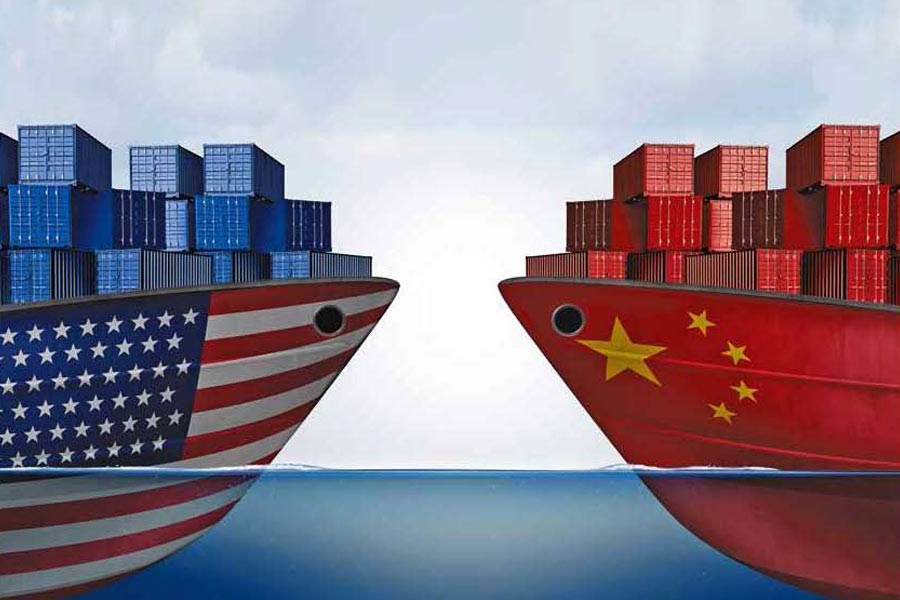The International Chamber of Commerce-Bangladesh (ICCB) has described the trade war between the United States and China as a major concern for global economy.
"The tariff fight between the two countries is often cited as the biggest risk to global investor confidence and a threat to the world economy," the ICCB said.
The chamber also urged the two countries to mitigate ongoing rivalry between them to ensure sustainable global economic growth.
These observations were made in the editorial of current News Bulletin (October-December 2018) of ICCB released on Monday.
Describing the US and China as world’s two biggest economies, the editorial mentioned that, "Trade and economic relations between the two countries are of great significance for world economy."
"Currently, the US is China's biggest export market and sixth biggest source of imports. On the other hand, China is the fastest growing export market and biggest source of imports for US," the ICCB said.
"Based on purchasing power parity (PPP) China has been the world's largest economy for last three years having economic output of $23.12 trillion, followed by EU countries ($19.9 trillion) and US ($19.4 trillion ) according to 2017 World Factbook of CIA (Central Intelligence Agency)," according to the editorial.
The chamber said the world's three largest economies combined have produced $62.4 trillion, 49 per cent of the world's total economy.
A trade war cannot help the entrenchment of trust and constructive cooperation in US-China relations, said the ICCB.
The editorial said, quoting the recently released White Paper by China, trade between the two states reached US$583.7 billion in 2017.

According to ICCB, China is their single biggest trading destination for most Asian nations while the US remains an invaluable economic partner.
"As a result, the escalating tensions between the two economic giants have caused unease for the region," it said.
Terming trade a major engine for growth, the editorial cited a data of World Bank, " the international economy's dependence on trade rose from 17.5 per cent in 1960 to 51.9 per cent in 2017."
It also quoted IMF's World Economic Outlook report that said raising tariffs and non-tariff trade barriers will disrupt the global value chain, slow down the spread of new technologies, lead to a drop in global productivity and investment and ultimately slow down growth trajectory.
The ICCB publication mentioned a statement of IMF that said all countries would suffer as a result of the tensions and cut back its GDP projection for the US to 2.5 per cent in 2019, and further still to 1.8 per cent in 2020.
"This has undoubtedly cast a long shadow worldwide at a time when US growth has been critical to the global economy," it said.
The editorial gave a brief description about the beginning of ongoing trade rivalry.
It said the Trump administration has instigated a trade war with China by imposing tariffs on a total of $250bn of imports from China.
"As counter to the US move, China is also imposing tariffs on $110bn of imports from US," the editorial said.
"There have been warnings from both the private and public sectors about the potential spill over effects on the world economy of the ongoing trade war between the two world economic powers," it mentioned.
According to the publication, Asia-Pacific Economic Cooperation (APEC) meeting held in November last year in Papua New Guinea could not come up with a joint statement.
The chamber said this was the first failure of this kind in the entity’s 25-year history due to the fight for dominance in the Pacific region between Australia, the US and Japan on one side and China on the other.
"This Summit has seen the unspoken tug-of-war for the Pacific coming out in the open," it added.
"However, US and China agreed to a temporary truce to escalate trade tensions, during G20 Summit in Buenos Aires on December 1, 2018," the editorial said.
It also cited an agreement between US and China that says the two countries will refrain from increasing tariffs or imposing new tariffs for 90 days (until March 1, 2019).
The publication also mentioned the first face-to-face meeting, began on January 7 in Beijing, since agreeing to a 90-day truce attended by official delegates of US and China.


